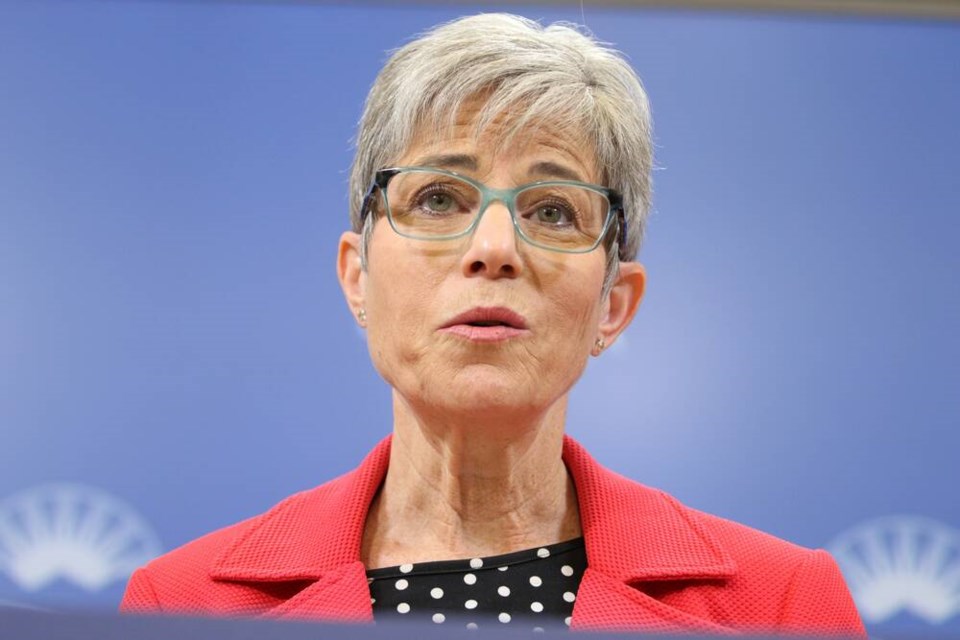The NDP government’s $172,568-a-year cabinet ministers have personally incurred several thousand dollars in penalties under a balanced-budget law during the pandemic because their government plunged into red ink while dealing with it.
But their suffering is over.
Finance Minister Selina Robinson is not only abolishing the balanced-budget law penalty permanently, she’s making it retroactive to cover last year as well.
“It sends the wrong message,” she told the legislature, defending a move being made while at least three more deficit budgets are forecast. “What it says to cabinets is: ‘You should choose to get your full salary over making sure that people have the services they need.’ Which to me, is a selfish way of doing governance.”
She said people expect their MLAs to make wise decisions based on needs, “Not: ‘Gee, we shouldn’t make this decision, because then I don’t get my holdback.’ ”
The holdback is how the penalty is imposed. Cabinet ministers get 20 per cent of their salary held back over the year. Then it is paid out later in two halves — one if the provincial budget is certified as balanced and the other if they don’t overspend their ministry budgets. The latter will continue.
There’s a case for suspending the penalty when the prime reason for the deficits is a global pandemic. But Robinson is going above and beyond that. Her move is tucked into the omnibus bill that enacts the entire provincial budget for the coming year. The deficit holdback is not only permanently rescinded starting this fiscal year; it’s rescinded retroactively to last year as well.
It took an afternoon of laboured, repetitive questioning by Liberal critic Peter Milobar about one clause to get a sense of what’s going on. At one point Robinson denied the clause had anything to do with holdbacks and insisted it did not represent a pay hike.
But plainly and simply it does. Cabinet ministers will get a holdback cheque soon, guaranteed. They didn’t get it last year. And there will be no conditions related to a balanced provincial budget from now on.
Robinson’s revulsion for holdbacks was on full display this week. She said the Liberal government imposed cuts “so that members of the executive council can get their full pay. I think that’s a terrible motivation. People have been hurt for 20 years because previous governments insisted that they collect their holdback.”
Although B.C. Liberals enacted the holdbacks in 2001, it was built entirely on what the previous NDP government legislated in 2000.
And Robinson’s attitude raises the question of why she’s only suspending half of what she considers a “horrifying” policy.
B.C. Green Leader Sonia Furstenau asked that and was told the portfolio holdback was useful for keeping ministries on track. Furstenau told the house Robinson is saying holdbacks aren’t responsible at the same time she’s saying they make ministers responsible.
The NDP cabinet only got half the holdback returned in two previous fiscal years back to 2019-20. That cost ministers $5,551 each, and the premier $9,992, in each year.
The fiscal year that ended March 31 hasn’t been certified yet. But there’s a sneaky clause in the bill that includes a significant date — back in 2021. That ensures retroactively that if a deficit is confirmed this summer as expected ministers won’t have to wave goodbye to their holdbacks as a result.
Robinson’s predecessor, Carole James, alluded to the holdbacks in 2020 as something cabinet would sustain in recognition of what people were going through. She said then she expected they’d be debated later, but “given the situation the people of B.C. are in … we feel it’s important right now to spend our focus, time and energy on supporting the people.”
They took hits in 2019-20 and 2020-21 but now apparently enough is enough.
Milobar said the retroactivity is misleading. The measure came to light in the February budget but was portrayed as taking effect this year, not last year. “The public perception was that this was a go-forward change.”
The central point is that Robinson is forecasting deficits for the next three years and doesn’t want to penalize her colleagues — or herself — for violating the balanced-budget law. Whether those future deficits are due to the pandemic or NDP spending habits will be open to debate. As far as their pay cheques are concerned, it doesn’t matter.




